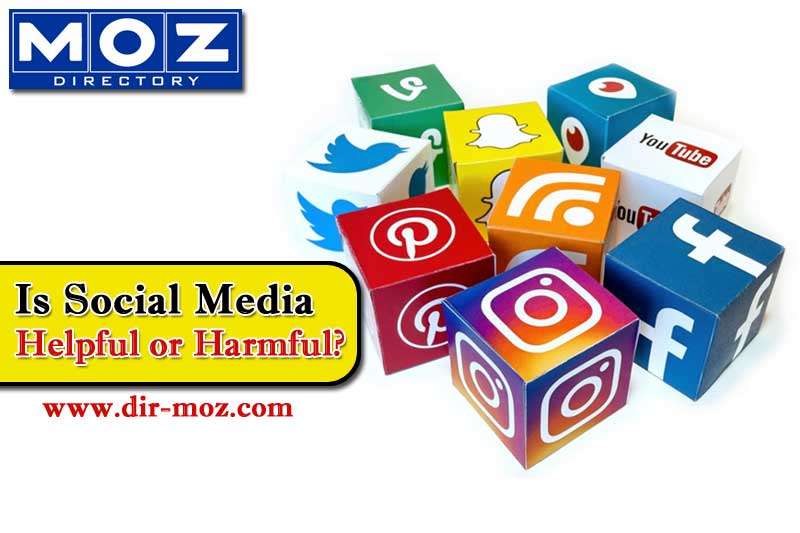Our phones are indispensable to work, school as well as our social and personal lives. Have you ever had a moment when you went out with your phone in your pocket and continued going? It’s become a major aspect of our daily life. The same is true for social media. It’s informing teenagers today. But is Social media helpful or harmful?
Like they say excess of everything is bad, be it intake of extra sugar in the body, or spending hours and hours on social media. In fact, it has been noted that youth no longer live happy life. All that they have is confined to that small screen (mobile phones).
Is this social media addiction good or bad for us? Well, we can’t deny that social media is very helpful when it comes to learning, or connecting to people across the globe. If we use it in limits, then social media is the best place to be.
Let’s have a look at factors on why is social media helpful or harmful for us!
Use of Social Media
In 2005, as social media was in its infancy, five percent of people within the United States were involved in social media. In 2019, that percentage was up to around 70 percent.
Pew Research Center surveyed social media use and its popularity in US adults at the beginning of 2019. The study revealed that the top social media platforms used by people over the age of 18 comprise YouTube and Facebook Teens prefer Snapchat and Instagram While TikTok is said to be the fastest-growing social media platform for younger users.
Social media usage is common among teens of today. Pew Research Center reports 97 percent of teens between 13 and 17 to have a minimum of one among the seven major platforms on the internet.
How much time you spend on social networks is staggering. A study suggests that the average teenager aged 13-18 spends around nine hours per day on social media per day. teens between the ages of 8 and 12 are active for around six hours each day.
Like all things, social media has its pros (the positive) as well as cautionary stories (the bad) and threats (the ugly) which lurk and can affect the lives of many people, particularly teenagers.
How Is Social Media Helpful?
Technology and social media give us more convenience and greater connectivity. Here are the pros of using social media in our day to day lives:
- Keeping in touch with family and friends around the world through text messages, emails, FaceTime, etc.
- Rapid internet access for information, research.
- Banking and bill payment.
- Online learning and job skills, as well as the discovery of content (YouTube).
- Participation in civic involvement (fundraising and social awareness allow for an opportunity for citizens to have a voice).
- Excellent marketing tools for marketing.
- Possibilities for remote work.
- Social media is an excellent thing, however, should teens ever find themselves feeling uncomfortable about things they read or see on social media, they should be able to trust their feelings and seek out help from an adult, a parent, or a trusted adult. The use of violence, threats, and bullying online are signs that the person who is doing these actions needs help.
Why Is Social Media Harmful?
Alongside the positives, there is the downside. While it has many benefits social media’s nature has a myriad of problems.
- Online vs Real. Social media isn’t the issue. It’s how people use it instead of real communication and socializing. “Friends” are on the social network may not be friends and could also be people who are strangers.
- More frequent use. The longer time you spend on social media could cause social anxiety, cyberbullying, depression, and exposure to material that isn’t age-appropriate.
- Social media is addictive. When you’re playing a sport or completing a task that you have to complete, you want to do it as efficiently as possible. If you do succeed your brain will send you a boost of dopamine and other hormones that promote happiness which makes you content. Similar mechanisms are in play when you upload a photo on Instagram and Facebook. After you’ve seen all notifications for likes and positive feedback appearing in your feed, it’s likely that you’ll begin to think of the reward as an award. But it’s not the only thing, social media can provide emotions that can alter your mood.
- The fear of missing out. FOMO is now a frequent subject and is often a reason for to constant checking of social media websites. The notion that you could miss something important when you’re not on the internet could affect your mental health.
- Self-image issues. Social media websites provide ways for users to get others’ approval for their appearance as well as the chance to judge themselves against other users. This can lead to concerns about body image. People who are “selfie-holics” and those who spend the majority of their time on social media and scrolling are most at risk of this. Actually, most college students who log on to Facebook more than five times a day are more likely to tie their self-esteem to their appearance. However, that doesn’t mean that the primary problem lies with social media. It just acts as a conduit for it that further exacerbates the issue. The same kind of behavior in other users.
Social Media And Cyberbullying
There is a negative side that technology can offer. Although bullying isn’t new, the advent of technological advancements and social media have taken bullying to a whole new dimension. It’s a continuous present threat – cyberbullying. It is a fact that the State of Rhode Island anti-bullying laws and regulations define cyberbullying and bullying in the following manner:
“Bullying” refers to the use in one or more classes of verbal, written, or electronic communication, or a physical act or gesture, or any combination of these directed at students that:
- may cause physical or emotional injuries to the student or causes damage to the property of the student.
- The student is at risk of injury to themselves or to property,
- Creates a fearsome, threatening, and hostile education environment for the student.
- violates the right of the pupil to take part in school activities. It violates the rights of students to participate in school.
- significantly and adversely affects the process of education or the regular operation of a school.
- “Cyberbullying” refers to bullying that occurs through technological means or electronic communications, which may include, but is not restricted to the transmission of signals, signs or writing images, sound data, texting, or other intelligence that is transmitted in total or in parts by wire radio, electromagnetic photo electronic or optical system, such as however not limited to email, Internet communication, instant messaging or facsimile messages.
Wrapping Up:
We are the ones who decide how our lives should be, or where we see ourselves 5 years down the lane, right? Then why let an online platform destroy all those beautiful plans that you have always wished for?
In this post, we had a closer look at why is social media good and bad both for our lives. It all depends on us, how we use it.



































